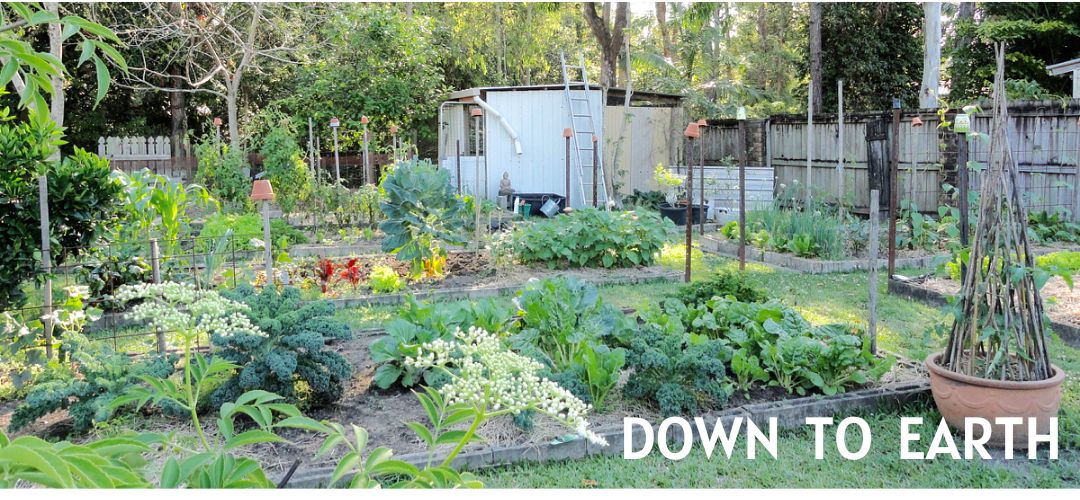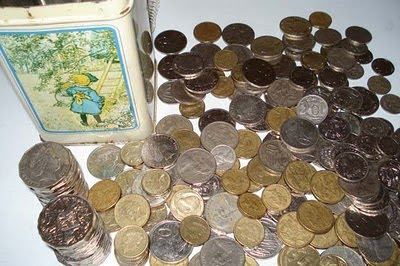Most people hate budgeting. I did too. I used to think that making up a budget would put restrictions on me and I didn't like the sound of that. But when we did up our first budget, I was surprised that instead of feeling restricted, I felt liberated. I knew we had money put aside for our bills and what I had in my purse and in the bank was available for spending. Soon after we started working to our budget, I stopped thinking about having money to spend, I was more concerned with not spending. I wanted to get off the consumers' bus and make my own way. I saw more value then in buying needs instead of wants and I still feel that way.
Before I write about how Hanno and I budget, I'd like to first write about money in general. Please remember that living simply is not about being miserable. It's the opposite of that. It is giving yourself the time and the opportunity to find happiness and to build it deep within your life. I like the idea of sacrifice, I liked the idea of having to give up things to help me get started. Giving up the things I'd always had was like a line in the sand for me; a definite point when I could say: THIS is me now, I am not a mindless shopper, now I buy things for a purpose. Those who have been reading here for a while will know I'm talking about giving up British Country Living. LOL! It's such a little thing but I loved that magazine, still do! I no longer buy it because that was my line in the sand - that was the point when my new life began. If I bought it again it would be a step backwards for me, a betrayal of my beliefs. In many ways it's my guage of authenticity. But that is me and you are a different kettle of fish. If you are struggling with your money, if you're in debt or saving for a deposit for a home, I have no doubt you too will have to give up things you love to reach your goals. However, if you are debt free and have more than enough money to live on your sacrifices will be more symbolic than practical, but significant and important just the same.
Most people know what they earn but very few can tell you, with accuracy, how much they spend each week. To work that out for yourself, you need to track your money. This is a real eye-opener. Get yourself a little notebook and pencil and take it with you every time you go out. EVERY TIME you spend something, write it and the price down in your notebook. If you buy an apple, groceries, a cup of coffee, a magazine - whatever, write it down. If you cheat on this, you're cheating yourself so please be accurate so you gain a genuine understanding of where your money is going. You'll have a bit of an idea after a week, after a month your spending patterns will start to emerge. Who knew that having a cup of coffee five days a week would cost you about $750 a year. That's an extra mortgage payment. Tracking your money will clearly show you that all those tiny amounts add up to a lot of wasted chances to be debt-free. I'm not saying that you give up all your pleasures, but there are sacrifices to be made, you decide what you will sacrifice. And always keep in mind your long term goals - to be debt-free, to be able to work if and when you feel like it, to travel, to help your children, or whatever your goals are.
When you sit down to do your budget, this money tracking notebook will be important. If you can't stretch your budget to cover what you need it to, go to your notebook and see what you can give up to pay your bills. Don't just look at the single price of anything, judge it instead by the price, multiplied by the number of times you will buy it in a month or a year. Along with Country Living, we gave up a few other things and pay TV which was then costing us about $80 a month - $960 a year. We've never missed it.
You all know I'm not a financial adviser, all I can tell you is how Hanno and I work out our budget and how me make it work for us. There are many other ways of doing this, but this is all I have experience with. When we first started, we got all our bills from the previous year so we had a good idea of what we spent on fixed bills like electricity, phone, internet, land rates, insurance etc. Our budget is a monthly budget because we usually do our grocery shopping once a month. So for our insurances - health, car, house etc, all of which are paid yearly, we divided each bill by 12 so we had a monthly amount. We did that with all our fixed bills - the electricity bill was quarterly so we divided that by four to give us a monthly amount. When we had worked out a monthly amount for every fixed bill we had to pay, we added all of them up to give us a monthly amount that we had to have in the bank to pay those fixed bills. For us that was around $800. Then we had to work out our cash spending for things like groceries, fuel, medical and medication costs and pocket money. For us that was around $650. So we knew we needed $1450 every month just to cover our every day costs ($363 a week). If you want a weekly budget, divide your yearly amounts by 52, or 26 for fortnightly.
We have a bank account where we transfer $800 a month for our fixed bills and we withdraw $650 in cash. That cash money is then divided up into ziplock bags labelled "groceries", "animal food", "garden and postage", "fuel", "medical", "bulk food" etc. If you want to use this kind of system, which is very easy and efficient, label your bags for the things you spend your cash on. So with your cash bagged up and the fixed bill money sitting in the bank, when your bills come in, you know you have the money there to pay and it takes the worry out of wondering if you'll be able to pay the bills.
Hanno and I have $50 each a month for pocket money that we can use however we like.
When we go out to do the grocery shopping, we take the money from that bag, and from the gardening bag if we need gardening supplies, or the animal food bag if we buy their food, and when we return with our supplies and the receipts, we put back the change into the bags in case it's needed again during the month. Don't leave it in your pocket or purse. We often have money left over in the bags at the end of the month, that money is put into our holiday fund or if we're not saving for anything, it just goes into the bank. When we have a sum large enough, Hanno transfers it to our ING online account, which gives a higher interest than we would get at our local bank.
Even though I used to think budgeting was a real horror, I now see it as a necessity and a bit of a game. You can do things like trying to reduce your grocery bill each month or decluttering your home and selling things on ebay or at a garage sale. That money can be used to pay off debt or go into your general savings. I guess my message here is don't let money control you. You take control and you will not regret it. Stop thinking "poor me", be proactive and deal with what you have in the most effective way you can. We all have to take responsibility for our own decisions, either now or down the track a bit. If you've been spending like a drunken sailor, giving no thought to your long term future, now is the time to stop, think about the life you want to live and start making the sacrifices that will make it happen. I'm here to tell you it's not half as bad as you think it will be, and the rewards, oh my, the rewards of sacrifice and budgeting are wonderful.
Please feel free to add how you manage your money. Sharing what you do may well be the one thing that helps someone else.
Tomorrow we'll talk about paying off credit cards, change jars, emergency funds and various ways to reduce your household costs.



